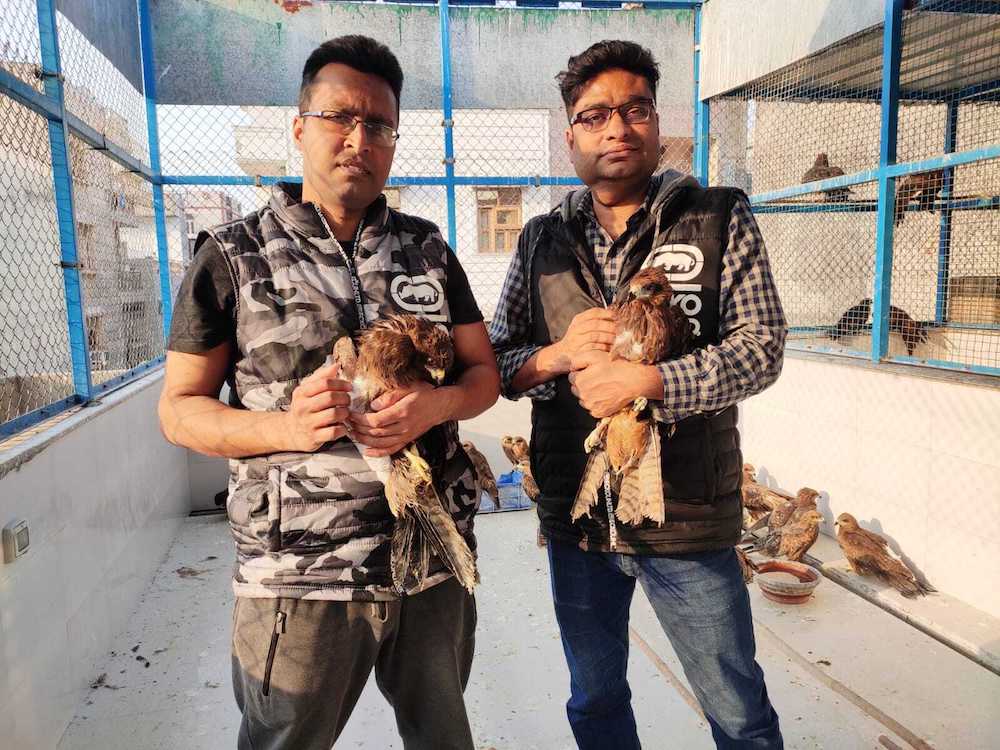NEW DELHI: For the last two decades, the walls of a small clinic in New Delhi’s Wazirabad neighborhood have silently watched over the healing of thousands of wounded raptors rescued by brothers Mohammad Saud and Nadeem Shehzad.
The birds of prey, falling from the capital’s leaden skies where most are fatally injured by paper kites, would often be left to their own fates. But Saud and Shehzad have made it their lives’ work to treat the injured birds.
“Our job is to rehabilitate wildlife,” Shehzad, 43, told Arab News.
“For us, there was no option but to learn on our own … There is no formal research and education on wildlife rehabilitation in India.”
In the clinic situated in the brothers’ basement office, Saud held in his hands a big kite that had torn its muscles. With the help of a vet, he then placed a rod to fix the wound.
“This bird was sent to us by a bird hospital. Its condition was very bad and we hope that once it recovers, the kite will be able to fly,” Saud, 40, told Arab News during a recent visit.
“We receive wild birds, mostly kites, from across Delhi. And there are two helpers who go and pick up the birds if we get a call.”
The clinic was sheltering more than 100 black kites in different stages of treatment, along with a couple of Egyptian vultures, several owls and other species of wild birds — which are all recuperating.
The brothers’ passion for wild birds started when they were teenagers in the mid-1990s, when the pair stumbled upon a black kite with wounded wings.
They took it to Delhi’s most prominent bird hospital, hoping to find shelter and treatment for the creature, only to be refused because it was a “non-vegetarian bird.”
Baffled, the brothers were left with “a sense of helplessness” that lingered. Over the years, they would come across wounded black kites on the streets and had no choice but to ignore them due to a lack of treatment facilities in the Indian capital.
Until one fateful day in April 2003, when upon stumbling on another injured black kite they decided that they couldn’t leave it be. With the help of a local vet, they nursed the maimed bird back to health. It couldn’t fly, but the kite stayed with them for 12 years until it died.
“That was the turning point in life, and from 2003 onwards we decided to bring such birds to our terrace and we made arrangements (to treat) such injured birds,” Shehzad said.
Since then, the brothers have rescued over 23,000 birds.
New Delhi has a huge population of raptors, with Shehzad estimating at least 25,000 kites in the capital because of slaughterhouses and meat processing plants. They often meet untimely deaths due to poison and nests being destroyed during construction and landscaping. Superstitious beliefs that depict raptors as harbingers of bad luck have also led people to destroy their nests and poison the creatures.
Despite their lack of formal training and the limited avenues for people specializing in wildlife in India, Saud and Shehzad make up for it with research and experiments, while also enlisting the help of animal doctors in the area.
“We did our own research, read books, searched the Internet and watched YouTube. Sometimes we also consulted human doctors to understand complex problems and apply them on birds,” Saud said.
On separate occasions, Saud and Shehzad received scholarships to visit the US for conferences organized by Minnesota-based National Wildlife Rehabilitators Association, which works to improve and promote wildlife rehabilitation.
“When we went there, we realized some of our works were unique, which people in the US were not aware of,” Shehzad said.
In 2010, they established Wildlife Rescue, a non-profit organization and charitable trust through which they receive foreign contributions that have helped them fund the rescue efforts — which cost about $1,600 every month. The brothers also run a family business making liquid-soap dispensers and other bathroom accessories.
Wildlife Rescue, which treats more than 2,000 raptors a year, is one of a handful of organizations in India dedicated to wildlife rehabilitation. Saud and Shehzad hope their country will soon boast a proper, dedicated center where “wildlife can be properly taken care of,” Shehzad said.
The brothers have rescued mostly black kites, which span across New Delhi. The species may not be endangered or particularly attractive, but enough birds have had their wings slashed while circling above the city over the years that Shehzad believes this is what they are meant to do.
“We try to find a solution to the problem. We feel that God is asking us to do that.”




